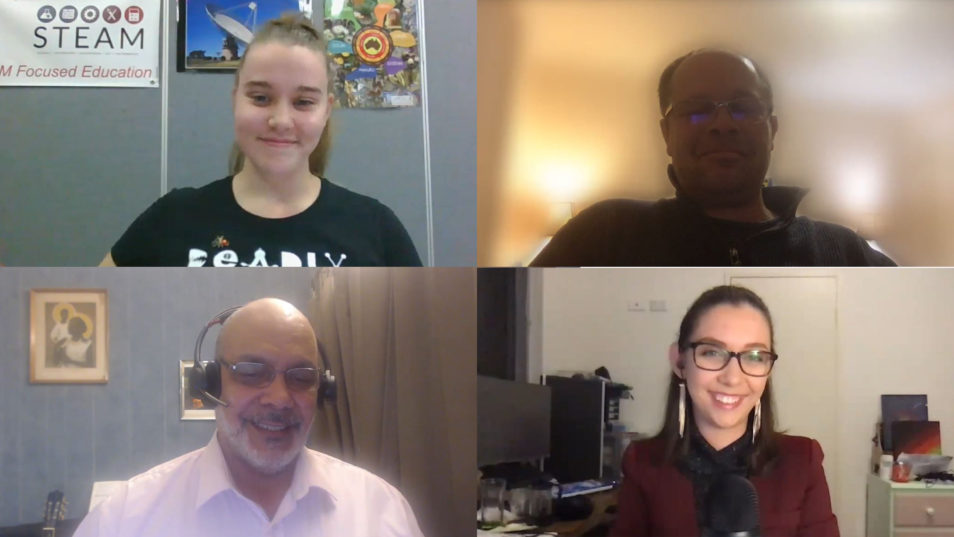
The virtual Indigenous Astronomy Panel celebrates the STEM passions and the important connection to Community and Country of the Indigenous STEM Award Winners.
A special virtual Indigenous Astronomy Panel took place on 30 June, inspired by and in celebration of Alana Dooley the 2019 Aboriginal and Torres Strait Islander Secondary Student STEM Achievement Award recipient. The event was broadcast from Perth and boasted a worldwide audience of 144 people. Joining from across Australia and globally, including India, it was an interactive experience with chat and Q&A functions.
The impressive panel included Alana Dooley, Dr Stacy Mader, Astrophysicist and Senior Experimental Scientist for CSIRO Astronomy and Space Science and Kirsten Banks, Astrophysicist and Science Communicator.
CSIRO Indigenous STEM Education’s executive manager Max Lenoy hosted the virtual event. The evening commenced with a heart-warming Welcome to Country from Noongar elders Vivienne and Morton Hansen at the Worl Wangkiny Centre: Perth Observatory.
“As a Noongar woman, my heart is really happy to stand here on Noongar Country here at Kalamunda. Our people lived here forever, and their spirits are still here,” Vivienne said.
The panel kicked off with a discussion about the importance of science communication in the field. The panel discussion centred around three main topics: the importance of science communications, mentor moments, and connecting with Country.
The importance of science communication
Kirsten said it’s important to share the excitement of science and share why we do what we do as scientists.
“To share what we’re researching, why we are researching it, how we’re researching it. To get people excited about going into space and, personally for myself as well, to inspire the next generation of scientists and astrophysicists just like you Alana,” she said.
“I think it’s really important that people like Kirsten are sharing their scientific ideas and making them really understandable, because I only have that high school level of understanding so, in order to evoke that interest, it’s really important that people can get that information out there in a really exciting way,” Alana said.
Mentor moments
Djai Hunter, 2019 winner of the Aboriginal and Torres Strait Islander Student Science Award, posed a powerful question to the panellists: Considering your experience of studying science as an Indigenous student, what do you wish you knew back then as a young high school student that you now know?
Alana shared valuable advice to younger students who aspire to follow in her footsteps.
“Take up every opportunity that comes your way and also seek out opportunities. If someone says to you there is an Indigenous science camp coming up, would you like to apply, just apply. You don’t know unless you try,” she said. “I guarantee it will be like an amazing experience.”
Stacy also shared some wise words of advice for the next generation:
“Be proactive from the get-go. In particular with STEM careers. Get involved, get out there. Join your local astronomy club. Join your local engineering club. Whatever is your passion, there is people out there that have the same passions that you do and learn from each other.”
Connecting with Country
Shailyn Isaac, 2017 Aboriginal and Torres Strait Islander Tertiary Student STEM Achievement Award winner, highlighted with a visual presentation the importance of Country. She posed a powerful question to the panellists: How do you stay connected to your community?
Kirsten shared how she personally connects with Country. “The way that I like to stay connected with country is through the stars.”
“That connection to the stars, the land, the sea and the people and that interconnectivity there from the stories, is just so beautiful, that is what I love so much about our culture. That we are all interconnected in this way, it is very complex, but also a simple way as well.”
Alana shared details of how she best connects with country: “I do all I can to be connected to culture always.”
“Two weeks ago I attended a meeting with about 20 other young Aboriginal people from Perth and we kind of talked about what we wanted to do as young Aboriginal people growing up, to see what we can do to inspire the young people but also carry on old people’s legacies,” she said.
Final words
The panel were invited to share some parting words, and they did not disappoint.
“I didn’t have any female or Indigenous role models growing up. So I think we need to be more diverse in what we portray science as. Because science is very diverse, and we should be showing it to the world,” Kirsten said.
“We need more Indigenous people out there to spread the word that, we are capable, we can do it and we are doing it,” Stacy said.
Alana said it’s all about changing the face of science.
“We need to be really encouraging people to ask questions. Always encourage them to ask questions, because at the end of the day that is what I think science is,” she said.
“If we stop people asking questions then we’re stopping future scientists. So keep encouraging kids to ask questions – that’s who will make the great scientists of tomorrow.”
Stay tuned
The Virtual Indigenous Astronomy Panel is the first of a series of virtual events. These events celebrate the STEM passions and interests of the 2019 Indigenous STEM Award winners.
Stay tuned for our future virtual event to celebrate our next 2019 Indigenous STEM Award winner.


3rd August 2020 at 10:49 am
Wonderful! We’ve been doing science for 60,000 years! It’s in our kid’s DNA! <3